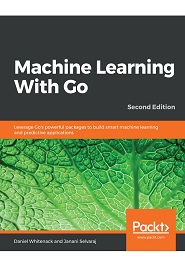
English | 2019 | ISBN: 978-1789619898 | 328 Pages | PDF, EPUB | 32 MB
Infuse an extra layer of intelligence into your Go applications with machine learning and AI
This updated edition of the popular Machine Learning With Go shows you how to overcome the common challenges of integrating analysis and machine learning code within an existing engineering organization.
Machine Learning With Go, Second Edition, will begin by helping you gain an understanding of how to gather, organize, and parse real-world data from a variety of sources. The book also provides absolute coverage in developing groundbreaking machine learning pipelines including predictive models, data visualizations, and statistical techniques. Up next, you will learn the thorough utilization of Golang libraries including golearn, gorgonia, gosl, hector, and mat64. You will discover the various TensorFlow capabilities, along with building simple neural networks and integrating them into machine learning models. You will also gain hands-on experience implementing essential machine learning techniques such as regression, classification, and clustering with the relevant Go packages. Furthermore, you will deep dive into the various Go tools that help you build deep neural networks. Lastly, you will become well versed with best practices for machine learning model tuning and optimization.
By the end of the book, you will have a solid machine learning mindset and a powerful Go toolkit of techniques, packages, and example implementations
What you will learn
- Become well versed with data processing, parsing, and cleaning using Go packages
- Learn to gather data from various sources and in various real-world formats
- Perform regression, classification, and image processing with neural networks
- Evaluate and detect anomalies in a time series model
- Understand common deep learning architectures to learn how each model is built
- Learn how to optimize, build, and scale machine learning workflows
- Discover the best practices for machine learning model tuning for successful deployments
Resolve the captcha to access the links!